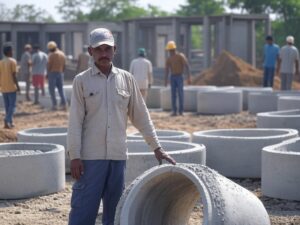Each of these companies operates in distinct yet overlapping sectors within the Indian industrial landscape, with a focus on infrastructure, construction, and industrial products:
-
Indian Hume Pipe Co. Ltd.
Indian Hume Pipe specializes in manufacturing and laying pre-stressed concrete pipes, offering solutions primarily for water supply, drainage systems, and sewage projects. It plays a key role in the infrastructure sector, particularly in government projects related to urban development, irrigation, and water treatment. The company has diversified into producing RCC (Reinforced Cement Concrete) pipes, with a focus on long-term contracts for municipal, state, and central government departments.
-
Jindal SAW Ltd.
Jindal SAW operates in the steel and pipe manufacturing industry, primarily producing large diameter welded pipes for water, gas, and oil pipelines. The company also manufactures a wide range of products, including steel, hollow sections, and ductile iron pipes, with a significant footprint in the global market. Jindal SAW serves diverse industries such as oil & gas, water distribution, and construction, both domestically and internationally.
-
Prakash Industries Ltd.
Prakash Industries focuses on steel production, primarily manufacturing mild steel billets, ferro alloys, and a range of steel products such as rebars, TMT bars, and wire rods. The company is a vertically integrated player in the steel industry, managing its operations from raw material sourcing to finished goods. It also has a significant presence in the power generation sector through its captive power plants. Prakash Industries is a key player in the domestic construction and infrastructure markets.
-
Kesoram Industries Ltd.
Kesoram Industries operates across multiple sectors, including cement manufacturing, tire production, and industrial fabrics. The company is most recognized for its cement division, which produces a variety of cements under the brand name “BIRLA.” Kesoram’s cement division is one of the leading suppliers in India, while its tire business under the “Birla Tyres” brand also contributes significantly to its revenue. The company is also involved in the manufacture of rayon and textile products.
The financial positions of these companies vary considerably, with differing degrees of profitability, debt exposure, and market capitalization. Below is an analysis of their latest financial performance (based on the most recent available data):
-
Indian Hume Pipe Co. Ltd.
Indian Hume Pipe’s financials are characterized by moderate revenue growth, often tied to government contracts. The company’s margins are generally stable but not as high as those in the steel or cement industries. It is relatively capital-intensive, relying on long-term contracts that provide steady cash flows but may be susceptible to changes in government spending on infrastructure. As of the latest financials, the company’s market capitalization stands at around ₹2,500 crore (roughly $335 million).
-
Jindal SAW Ltd.
Jindal SAW has a strong financial position, with consistent revenue growth driven by both domestic and international demand for its steel and pipe products. The company’s ability to generate cash flow from its diversified product offerings in the energy and infrastructure sectors positions it well for sustained profitability. The market cap is approximately ₹11,000 crore (about $1.47 billion), reflecting a robust financial profile supported by healthy margins and a global presence.
-
Prakash Industries Ltd.
Prakash Industries has experienced significant growth in its steel and power segments, benefiting from increased demand in the construction and industrial sectors. Despite facing volatility in raw material prices (especially coal), the company has managed to maintain strong profitability due to its integrated business model. The company’s market cap hovers around ₹2,000 crore ($265 million), with strong debt management and a reasonable P/E ratio.
-
Kesoram Industries Ltd.
Kesoram’s financials are more diverse due to its operations in cement, tires, and textiles. Its cement division drives the bulk of revenue, supported by steady demand in the infrastructure sector. The company’s tire business, however, has faced stiff competition from other domestic and international players. Kesoram has a market cap of ₹3,500 crore ($465 million), and its financial health has been mixed, with profitability fluctuating due to its reliance on cyclical sectors like cement and tires.
The future strategies of these companies are crucial in determining their growth trajectories:
-
Indian Hume Pipe Co. Ltd.
The company is focusing on expanding its infrastructure projects portfolio, particularly in water and sewage systems. The government’s emphasis on smart cities and water supply schemes presents long-term growth opportunities. Indian Hume Pipe is also aiming to diversify its product line to include new solutions for urban development projects. However, the company’s reliance on government contracts exposes it to the risk of policy changes or funding delays.
-
Jindal SAW Ltd.
Jindal SAW has been expanding its footprint in the international markets, with a focus on expanding pipeline infrastructure for oil & gas projects globally. It is also increasing its focus on producing ductile iron pipes, a growing segment in water distribution systems. The company’s strong R&D efforts in pipeline technologies and its growing exposure to non-residential infrastructure projects position it well for long-term growth.
-
Prakash Industries Ltd.
Prakash Industries is focusing on increasing its steel production capacity and leveraging its captive power plants to reduce energy costs. The company is also pursuing capacity expansion in the ferro alloys segment. It has also expressed interest in expanding its steel products into new markets. However, the volatility in global steel prices could present challenges to sustained profitability.
-
Kesoram Industries Ltd.
Kesoram is focusing on expanding its cement business, with investments in modernizing its plants and increasing production capacity. The company is also working to increase its presence in the tire and industrial fabrics sectors, although it faces tough competition from more established players in these markets. Given the high demand for infrastructure and construction, Kesoram’s cement division remains the most promising growth avenue.
-
Indian Hume Pipe Co. Ltd.
Strengths: Stable cash flows from government contracts, expertise in the infrastructure sector.
Weaknesses: Heavy dependence on public sector spending, slow growth in domestic market expansion.
-
Jindal SAW Ltd.
Strengths: Diverse product portfolio, strong international presence, robust financial health.
Weaknesses: Exposure to fluctuations in raw material prices, competition in international markets.
-
Prakash Industries Ltd.
Strengths: Vertically integrated operations, strong foothold in steel production, captive power generation.
Weaknesses: Exposure to fluctuations in steel and coal prices, debt levels, and cyclical demand in construction.
-
Kesoram Industries Ltd.
Strengths: Leading cement brand, diversified product base, established brand in tires and textiles.
Weaknesses: Limited growth in the tire segment, fluctuating profitability in diverse sectors, reliance on cyclical industries.
While all four companies—Indian Hume Pipe, Jindal SAW, Prakash Industries, and Kesoram Industries—compete in different niches of the infrastructure and industrial sectors, their market positions and growth strategies differ significantly. Indian Hume Pipe’s future hinges largely on government projects, Jindal SAW capitalizes on its international reach, Prakash Industries focuses on expanding steel production, and Kesoram’s growth is driven by its cement and tire divisions. Each company faces unique risks, such as dependency on government contracts or commodity price volatility, which investors should consider.




